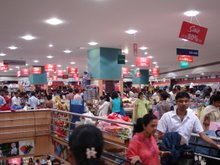Shopping malls become double-edged sword for retailers
The Indian retail space is set for an interesting showdown. Retailers are seeking fast completion of shopping mall projects to meet their expansion targets, but are also wary of intense competition this mall-mania could lead to. Malls are expected to emerge as major drivers of the Indian retail sector growth story, for which lack of quality space has long been a major deterrent, the analysts believe.
The entry of giants like Reliance Industries, Bharti Walmart, Aditya Birla Group, Tatas as well as expansion plans of Pantaloon and Shopper's Stop are driving the demand for shopping malls to untouched territories. Lack of quality space should no more be a deterrent to the growth of organized retail as mall space has risen in the past few years and is expected to rise even further, retail sector analysts at Merrill Lynch believe. However, anecdotal evidence suggests mall developers are running behind their delivery schedules, Merrill Lynch's Vandana Luthra and Manish Sarawagi said. Making the situation even more complex, the retail sector is set to witness intense competition if by a remote chance the projects are completed on time, the analysts wrote in a report. A further surge in competition could dampen the growth momentum in this sector, which is already battling with issues like huge cost pressure arising from increased salary costs, rentals and interest rate hikes. In the current scenario, the competition would intensify only after delivery of new malls and competitive pressure in terms of sales realisations is less of an issue given lack of appropriate real estate, the analysts believe. According to Merrill Lynch, if the new malls come up as scheduled, the competitive threat for existing retailers like Pantaloon and Shoppers' Stop would be particularly intense. A recent survey by ICICI Property and Technopak suggested that malls would account for half of the total organised sector retail space demand in the next five years.
There are over 200 new malls currently in construction or planning stages, as against nearly half of this number already operating across the country. Nonetheless, from a long-term perspective, the "malling" of
There could be over 350 malls here by the next year, out of which about a third are coming up in and around
The country's top seven cities Mumbai, Delhi & NCR, Kolkata, Chennai, Bangalore, Hyderabad and Pune have emerged as the major hubs of the mall development with two-third of new mall space coming at these places, Merrill Lynch's Vandana Luthra and Manish Sarawagi said. Although these cities account for just about seven per cent of total population, they make up for 41 per cent of population with monthly household income of more than 1,000 dollars, making them major targets of organized retailers. According to India Retail Report 2007, the total Indian retail market is estimated at around Rs 10 trillion with about six per cent per annum growth over the past two years. The organised retail accounts for less than five per cent of total market size here, even below developing countries like


No comments:
Post a Comment